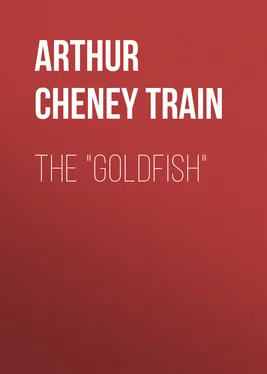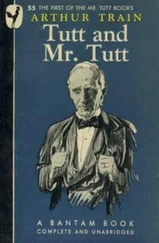Arthur Train - The Goldfish
Здесь есть возможность читать онлайн «Arthur Train - The Goldfish» — ознакомительный отрывок электронной книги совершенно бесплатно, а после прочтения отрывка купить полную версию. В некоторых случаях можно слушать аудио, скачать через торрент в формате fb2 и присутствует краткое содержание. Жанр: Биографии и Мемуары, popular_business, foreign_antique, на английском языке. Описание произведения, (предисловие) а так же отзывы посетителей доступны на портале библиотеки ЛибКат.
- Название:The Goldfish
- Автор:
- Жанр:
- Год:неизвестен
- ISBN:нет данных
- Рейтинг книги:5 / 5. Голосов: 1
-
Избранное:Добавить в избранное
- Отзывы:
-
Ваша оценка:
- 100
- 1
- 2
- 3
- 4
- 5
The Goldfish: краткое содержание, описание и аннотация
Предлагаем к чтению аннотацию, описание, краткое содержание или предисловие (зависит от того, что написал сам автор книги «The Goldfish»). Если вы не нашли необходимую информацию о книге — напишите в комментариях, мы постараемся отыскать её.
The Goldfish — читать онлайн ознакомительный отрывок
Ниже представлен текст книги, разбитый по страницам. Система сохранения места последней прочитанной страницы, позволяет с удобством читать онлайн бесплатно книгу «The Goldfish», без необходимости каждый раз заново искать на чём Вы остановились. Поставьте закладку, и сможете в любой момент перейти на страницу, на которой закончили чтение.
Интервал:
Закладка:
Ten o'clock sees me at my office. The effect of the coffee has begun to wear off slightly. I am a little peevish with my secretary, who has opened and arranged all my letters on my desk. There are a pile of dividend checks, a dozen appeals for charity and a score of letters relating to my business. I throw the begging circulars into the waste-basket and dictate most of my answers in a little over half an hour. Then come a stream of appointments until lunchtime.
On the top floor of a twenty-story building, its windows commanding a view of all the waters surrounding the end of Manhattan Island, is my lunch club. Here gather daily at one o'clock most of the men with whom I am associated—bankers, railroad promoters and other lawyers. I lunch with one or more of them. A cocktail starts my appetite, for I have no desire for food; and for the sake of appearances I manage to consume an egg Benedictine and a ragout of lamb, with a dessert.
Then we wander into the smoking room and drink black coffee and smoke long black cigars. I have smoked a cigar or two in my office already and am beginning, as usual, to feel a trifle seedy. Here we plan some piece of business or devise a method of escaping the necessity of fulfilling some corporate obligation.
Two or half-past finds me in my office again. The back of the day is broken. I take things more easily. Later on I smoke another cigar. I discuss general matters with my junior partners. At half-past four I enter my motor, which is waiting at the Wall Street entrance of the building. At my uptown club the men are already dropping in and gathering round the big windows. We all call each other by our first names, yet few of us know anything of one another's real character. We have a bluff heartiness, a cheerful cynicism that serves in place of sincerity, and we ask no questions.
Our subjects of conversation are politics, the stock market, "big" business, and the more fashionable sports. There is no talk of art or books, no discussion of subjects of civic interest. After our cocktails we usually arrange a game of bridge and play until it is time to go home to dress for dinner.
Until this time, usually, I have not met my wife and daughters since the night before. They have had their own individual engagements for luncheon and in the afternoon, and perhaps have not seen each other before during the day. But we generally meet at least two or three times a week on the stairs or in the hall as we are going out. Sometimes, also, I see my son at this time.
It will be observed that our family life is not burdensome to any of us:—not that we do not wish to see one another, but we are too busy to do so. My daughters seem to be fond of me. They are proud of my success and their own position; in fact they go out in the smartest circles. They are smarter, indeed, than their mother and myself; for, though we know everybody in society, we have never formed a part of the intimate inner Newport circle. But my daughters are inside and in the very center of the ring. You can read their names as present at every smart function that takes place.
From Friday until Monday they are always in the country at week-end parties. They are invited to go to Bermuda, Palm Beach, California, Aiken and the Glacier National Park. They live on yachts and in private cars and automobiles. They know all the patter of society and everything about everybody. They also talk surprisingly well about art, music and international politics. They are as much at home in Rome, Paris and London as they are in New York, and are as familiar with Scotland as Long Island. They constantly amaze me by the apparent scope of their information.
They are women of the world in a sense unheard of by my father's generation. They have been presented at court in London, Berlin and Rome, and have had a social season at Cairo; in fact I feel at a great personal disadvantage in talking with them. They are respectful, very sweet in a self-controlled and capable sort of way, and, so far as I can see, need no assistance in looking out for themselves. They seem to be quite satisfied with their mode of life. They do as they choose, and ask for no advice from either their mother or myself.
My boy also leads his own life. He is rarely at home except to sleep. I see less of him than of my daughters. During the day he is at the office, where he is learning to be a lawyer. At wide intervals we lunch together; but I find that he is interested in things which do not appeal to me at all. Just at present he has become an expert—almost a professional—dancer to syncopated music. I hear of him as dancing for charity at public entertainments, and he is in continual demand for private theatricals and parties. He is astonishingly clever at it.
Yet I cannot imagine Daniel Webster or Rufus Choate dancing in public even in their leisure moments. Perhaps, however, it is better for him to dance than to do some other things. It is good exercise; and, to be fair with him, I cannot imagine Choate or Webster playing bridge or taking scented baths. But, frankly, it is a far cry from my clergyman grandfather to my ragtime dancing offspring. Perhaps, however, the latter will serve his generation in his own way.
It may seem incredible that a father can be such a stranger to his children, but it is none the less a fact. I do not suppose we dine together as a family fifteen times in the course of the winter. When we do so we get along together very nicely, but I find myself conversing with my daughters much as if they were women I had met casually out at dinner. They are literally "perfect ladies."
When they were little I was permitted a certain amount of decorous informality, but now I have to be very careful how I kiss them on account of the amount of powder they use. They have, both of them, excellent natural complexions, but they are not satisfied unless their noses have an artificial whiteness like that of marble. I suspect, also, that their lips have a heightened color. At all events I am careful to "mind the paint." But they are—either because of these things or in spite of them—extraordinarily pretty girls—prettier, I am forced to admit, than their mother was at their age. Now, as I write, I wonder to what end these children of mine have been born into the world—how they will assist in the development of the race to a higher level.
For years I slaved at the office—early, late, in the evenings, often working Sundays and holidays, and foregoing my vacation in the summer.
Then came the period of expansion. My accumulations doubled and trebled. In one year I earned a fee in a railroad reorganization of two hundred thousand dollars. I found myself on Easy Street. I had arrived—achieved my success. During all those years I had devoted myself exclusively to the making of money. Now I simply had to spend it and go through the motions of continuing to work at my profession.
My wife and I became socially ambitious. She gave herself to this end eventually with the same assiduity I had displayed at the law. It is surprising at the present time to recall that it was not always easy to explain the ultimate purpose in view. Alas! What is it now? Is it other than that expressed by my wife on the occasion when our youngest daughter rebelled at having to go to a children's party?
"Why must I go to parties?" she insisted.
"In order," replied her mother, "that you may be invited to other parties."
It was the unconscious epitome of my consort's theory of the whole duty of man.
CHAPTER II
MY FRIENDS
By virtue of my being a successful man my family has an established position in New York society. We are not, to be sure—at least, my wife and I are not—a part of the sacrosanct fifty or sixty who run the show and perform in the big ring; but we are well up in the front of the procession and occasionally do a turn or so in one of the side rings. We give a couple of dinners each week during the season and a ball or two, besides a continuous succession of opera and theater parties.
Читать дальшеИнтервал:
Закладка:
Похожие книги на «The Goldfish»
Представляем Вашему вниманию похожие книги на «The Goldfish» списком для выбора. Мы отобрали схожую по названию и смыслу литературу в надежде предоставить читателям больше вариантов отыскать новые, интересные, ещё непрочитанные произведения.
Обсуждение, отзывы о книге «The Goldfish» и просто собственные мнения читателей. Оставьте ваши комментарии, напишите, что Вы думаете о произведении, его смысле или главных героях. Укажите что конкретно понравилось, а что нет, и почему Вы так считаете.












